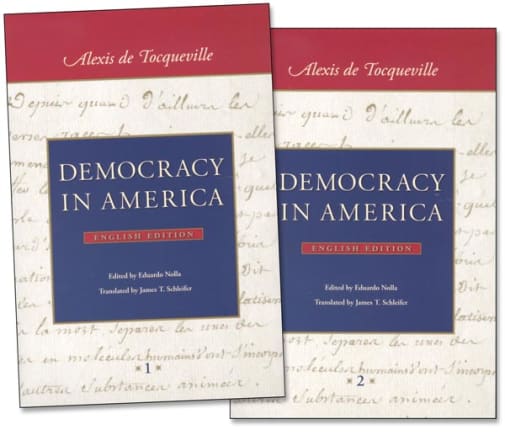In 1831, Alexis de Tocqueville and Gustave de Beaumont spent nine months in the United States studying American prisons on behalf of the French government. Along with the prison system, they studied every aspect of American public and private life-the political, economic, religious, cultural and social life of our young nation. One profound discovery Mr. Tocqueville noted was the leading role of religion with its constitutional separation from government. Mr. Tocqueville wrote about his experiences, first amazing readers in 1835 and 1840, and these writings continue to amaze readers today. This scholarly work features the English translation, translation notes, listing of key terms, appendices, early outlines, drafts, extensive bibliography, and other vital references for the serious student of democracy. Two volume set totals nearly 1700 pgs. SC. ~Deanne
Democracy in America: English Edition
SKU
018645
ISBN
9780865978409
Grade 10-AD
These icons are designed to help you quickly understand and learn important information about our products.
Teaching Method
Traditional
Teacher-centered curriculum commonly used in classrooms that may include a text, teacher manual, tests, etc.
Charlotte Mason
A methodology based on the work of a 19th century educator who maintained that children learn best from literature (Living Books), not textbooks.
Classical
A methodology based on the Latin Trivium (three stages of learning), including the grammar stage (memorization and facts), logic stage (critical thinking), and rhetoric stage (developing/defending ideas).
Unit Study
A thematic or topical approach centered around one topic that integrates multiple subject areas.
Montessori (Discovery)
A methodology based on the work of a 20th century educator that emphasizes student and sensory-driven discovery learning and real-life applications.
Other
Other methodologies
Religious Content
Secular
Contains content contrary to common Christian beliefs (i.e. evolution).
Neutral
Avoids religious or theoretical topics or presents multiple viewpoints without preference.
Christian/Religious
Faith-based or including instructional religious content.
Learning Modality
Auditory
Learns through listening, talking out loud or reading out loud.
Visual
Learns through seeing, prefers written instructions and visual materials.
Kinesthetic/Tactile (Hands-On)
Learns through moving, doing and touching.
Multi-Sensory
Curriculum that employ a variety of activities/components.
Presentation
Sequential
Curriculum progresses through well-defined learning objectives. Emphasizes mastery before moving to the next topic.
Spiral
Topics and concepts are repeated from level to level, adding more depth at each pass and connecting with review.
Conceptual/Topical
Focus is on the “why,” often with a unifying concept as well as specific skills; coverage may be broader.
Teacher Involvement
Low Teacher Involvement
Student-led materials; parent acts as a facilitator.
Medium Teacher Involvement
A mix of teacher-led time and independent student work.
High Teacher Involvement
Teacher-led lessons; may utilize discussions, hands-on activities and working together.
Additional Materials Required
No other materials needed
Everything you need is included.
Other Materials Required
There are additional required resources that are a separate purchase.
Other Materials Optional
There are additional resources mentioned or recommended but are not absolutely necessary.
Consumable
Consumable
Designed to be written in; not reusable.
Non-Consumable
Not designed to be written in; reusable.
Our Price
$22.00 $22.00 $20.75
Rainbow Savings: $1.25
Description
Publisher's Description of Democracy in America: English Edition
This English-only edition of Democracy in America features Eduardo Nolla's incisive notes to James Schleifer's English translation of the French text, with an extensive selection of early outlines, drafts, manuscript variants, marginalia, unpublished fragments, and other materials: "This new Democracy is not only the one that Tocqueville presented to the reader of 1835, then to the reader of 1840 . . . the reader will see how Tocqueville proceeded with the elaboration of the main ideas of his book."
Details
| Product Format: | Paperback |
|---|---|
| Grades: | 10-AD |
| Brand: | Liberty Fund |
| Author: | Alexis de Tocqueville, James T |
| ISBN: | 9780865978409 |
| Length in Inches: | 9 |
| Width in Inches: | 6.125 |
| Height in Inches: | 4.25 |
| Weight in Pounds: | 5.9062 |
Videos
Reviews

